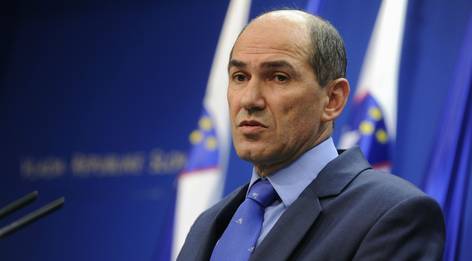NEWS
Slovenian Prime Minister Janez Janša: “What appears to be the principal problem has much deeper roots”
“I hope that the situation in the country will result in solutions oriented against centralism, towards regionalisation and different distribution of income. I hope that two to three thousand million euro will be redistributed from the national budget to the lower levels. To local and regional budgets where the responsibility will be distributed as well as the level of power of disposal with money,” said the Prime Minister of the Republic of Slovenia, Janez Janša, after the regular coalition meeting.
“People who live below a certain income level and find it hard to make ends meet express their protest in this way,” said the Prime Minister and added that whatever politics may say about changes, nothing will change before better economic conditions have been created.
“The reactions to these changes in the twenty years of independent Slovenia, not even in the times of crisis, were not the right ones. Last year, 60 per cent of money went to the central Slovenia and 40 per cent to other regions,” summarised the Prime Minister. He added that centralism is one of the basic levers of management in this country and none of the problems now manifested as political can be eliminated without first eliminating the non-proportional development level. “If we look at the turnout of voters at the last five elections in Slovenia – which means that this is not only typical of the latest presidential elections – we may see that lower development level is strongly correlated to the turnout of voters. The lower the development level of a region, the higher the unemployment rate, and the lower the turnout of voters.”
“What appears to be the principal problem today has much deeper roots in many aspects. And this will be a more difficult task to tackle,” noted Prime Minister Janez Janša. The coalition has agreed on the system aimed at eliminating these blocks. None of this, however, will increase the participation of citizens at the elections and trust in the institutions until the economic situation has changed. And until people have begun to believe that they live in a state governed by justice, not only by the rule of law. “The state is governed by the rule of law; it has laws, but these laws do not apply to everyone equally. The number of backlog of court cases in Slovenian courts amounts to almost half a million, which means that almost one adult citizen in three has a personal problem that cannot be resolved in a realistic time.” This reflects in dissatisfaction further fuelled by the economic and financial crisis.
The Prime Minister said he fosters no illusions that all necessary measures could be harmonised in a short period. The coalition, however, agreed on the method today. A meeting of all presidents of parliamentary parties and leaders of parliamentary groups will be held in the next few days where all proposals will be discussed. “I hope this meeting will be different from the one held in June, when we could not reach an agreement and our credit ratings fell,” stressed Prime Minister Janša and added that the opposition bears a responsibility for changes, too, as a broader consensus is needed.
As regards the possible changes concerning the dismissal of deputies, the Prime Minister said: “I think the experts will strongly oppose this, claiming that this is not possible and in contravention with the Constitution of the Republic of Slovenia. Therefore the constitution will have to be amended.”
In his comment on recent protests and calls for resignation of the Mayor of Maribor, the Prime Minister said that replacement of the mayor will not resolve structural problems faced by Slovenia. This is based on a significant difference in the development levels of the eastern and the western part of the country. “We have the central region of Ljubljana and the western part of Slovenia, whose development level amounts to 106 per cent of the EU average, and then we have the eastern Slovenia which reaches 73 per cent of the EU development level. We have Ljubljana, which is more developed than Germany on average, and the eastern region whose development level equals that of Hungary.” The Prime Minister said: “Maribor may change two mayors a year, but this will not solve our structural problems.” He added that radars were the trigger for the present situation rather than its cause.





